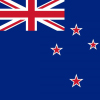INTELLECTUAL PROPERTY RIGHTS IN NEW ZEALAND

Opposition Term |
03 Months |
Registration Term |
10 Years |
First Renewal Term |
10 Years |
Subsequent Renewal Term |
10 Years |
The laws dealing with the mechanism of trademark registration and protection in New Zealand include - The Trade Marks Act 2002 (all sections brought into force on 20th August 2003); The Trade Marks Amendment Act 2011 (all sections brought into force on 29th April 2013); The Trade Marks Regulations 2003 (all sections brought into force on 20th August 2003); The Trade Marks Amendment Regulations 2012 (all sections brought into force on 10th December 2012); and The Regulatory Systems (Economic Development) Amendment Act 2019 (all sections brought into force on 13th February 2020).
New Zealand is a member of the Madrid Protocol.
For seeking trademark protection in New Zealand, an application has to be filed with the New Zealand Intellectual Property Office (IPONZ).
It follows the 11th edition of Nice Classification. Multi-class trademark applications are acceptable.
The third parties can file opposition actions against a trademark application within three (03) months following its publication date.
In New Zealand, registered trademarks have a validity of ten (10) years from the date of application or, if applicable, the convention priority date (referred to as the 'deemed date of registration). Trademark registrations can be further renewed indefinitely for successive periods of ten (10) years each.
The grace period to renew a trademark after the date of expiry is six (06) months.
The period for cancellation of a registered trademark based on non-use is three (03) years from the date of registration.
New Zealand is a member of the Paris Convention for the Protection of Industrial Property and the Patent Cooperation Treaty (PCT).
The Patents Act 2013 deals with the mechanism of patent protection in New Zealand.
For seeking patent protection in the nation, an application has to be filed with the Intellectual Property Office of New Zealand (IPONZ).
In New Zealand, two types of patents can be protected, namely product patents and process patents.
The types of patent applications that can be filed include Non-Convention Application, Convention Application, PCT National Phase Application, Divisional Application, and Patent of Addition.
The time frame for PCT national phase filing is thirty-one (31) months.
In New Zealand, an opposition against a patent application can be raised at the pre-grant. At the pre-grant stage, any third party may raise an opposition within three (03) months (after the patent gets published but before it is granted) approximately. Also, revocation is possible at any time during the patent protection term.
Patents last for twenty (20) years in New Zealand. The first annuity will be due in the 4th year, and the last annuity will be due in the 20th year. The payment of annuities must be made within six (06) months before the due date.
The Designs Act, 1953 governs and deals with the mechanism of registration of industrial designs in New Zealand.
The types of industrial design applications that can be filed in New Zealand include Non-Convention Application and Convention Application.
Utility model protection isn't provided under industrial design protection in the nation.
Opposition against an industrial design application can't be raised in New Zealand.
The total duration of industrial design registration in New Zealand is fifteen (15) years from the filing or priority date. The initial registration term is five (05) years, which is further extendible for two (02) terms of five (05) years each upon payment of the renewal fee.
The time frame for payment of the renewal fee before the due date is six (06) months.
There is a grace period of six (06) months to renew a registered industrial design.
New Zealand is a party to several international copyright agreements, including the TRIPS Agreement 1994, the Berne Convention 1928, and the Universal Copyright Convention 1952.
The copyright law of New Zealand is covered by the Copyright Act 1994 and subsequent amendments.
The Copyright Act 1994 provides owners of original works with a monopoly to control the use and dissemination of their work. The owners of copyright in creative works have the exclusive right to exploit the economic rights.
The standard copyright protection term (literary, dramatic, musical, and artistic works) lasts for the lifetime of the author plus fifty (50) years following his death. However, the duration of copyright protection varies depending on the type of work.
For sound recordings and films, the copyright protection term lasts for fifty (50) years from the date when they were made available to the public.

